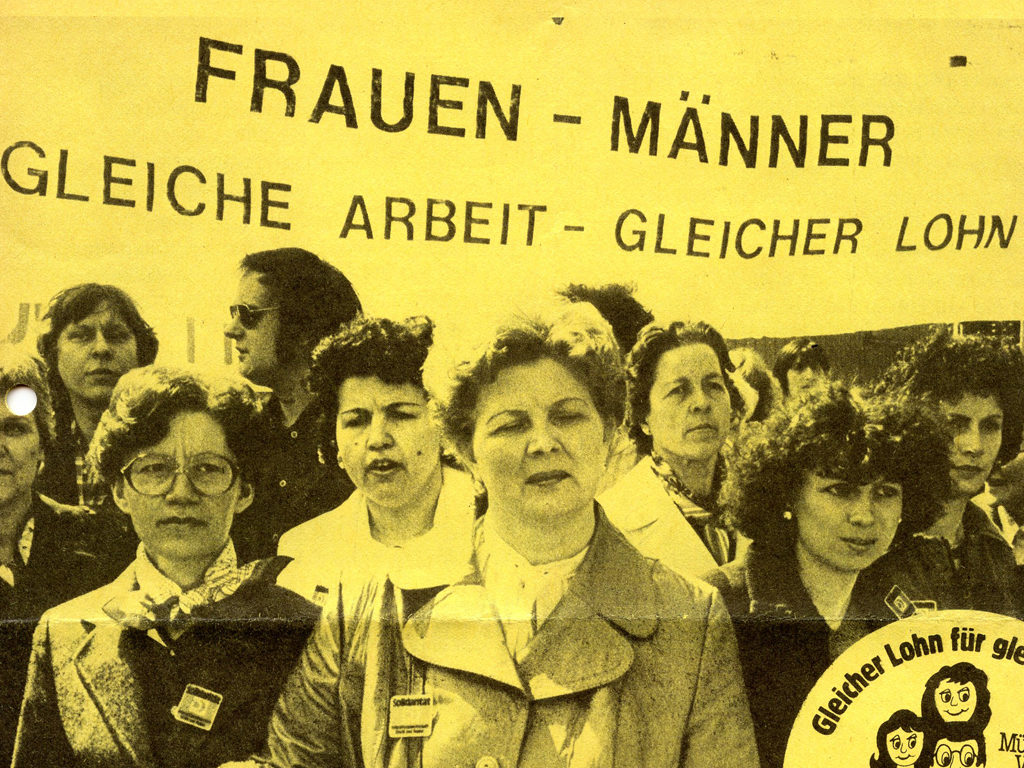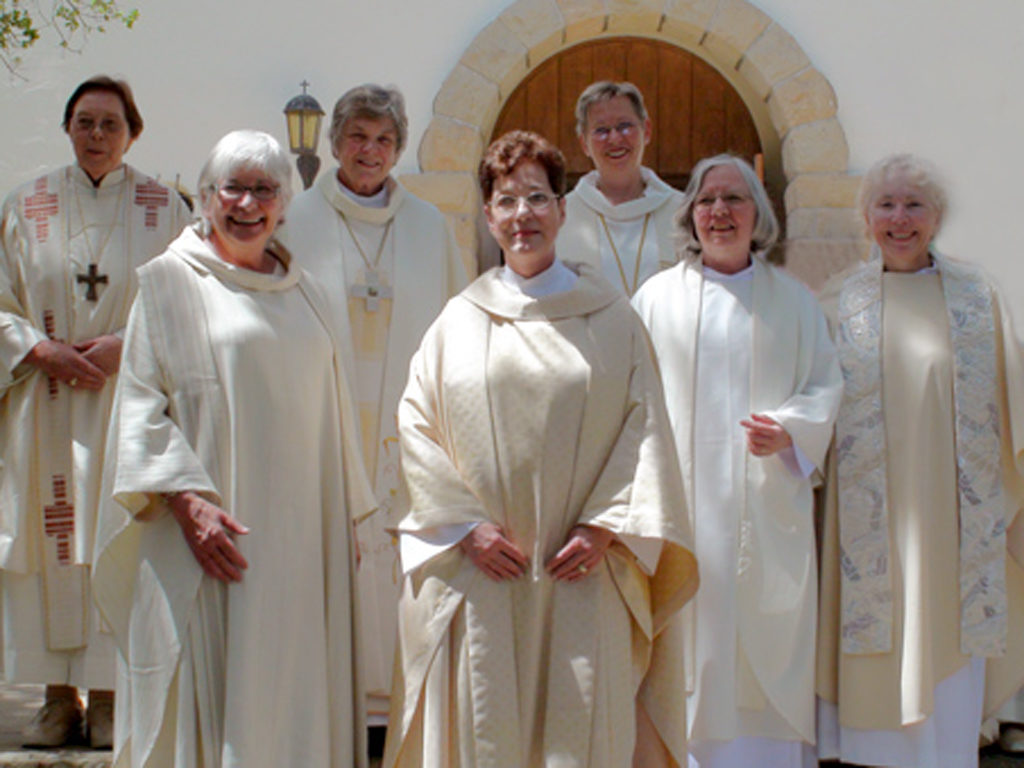Beginning in the early 1970s, women – students and lecturers – began to reappraise the history of their exclusion from scholarship. They demanded that research about as well as by women receive a distinct space in the academy.
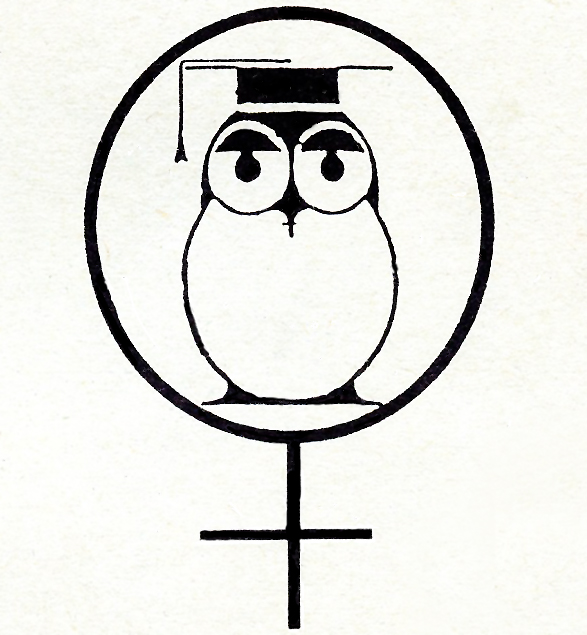
Because academia was thoroughly dominated by men, research about women and the reality of their lives was either insufficient or paternalistically distorted in almost all academic disciplines. Before long, the first professorships for women’s studies were created; the number of female doctoral candidates and professors also increased continually, if slowly. At the same time, women’s studies became institutionalised. Gender studies – which had established itself in the 1980s – partially distanced itself from the original feminist orientation of women’s studies and focused instead on deconstructing the gender binary, which led to the repeal of ‘woman’ as a political category.
1974: The First ‚Women’s Seminars‘
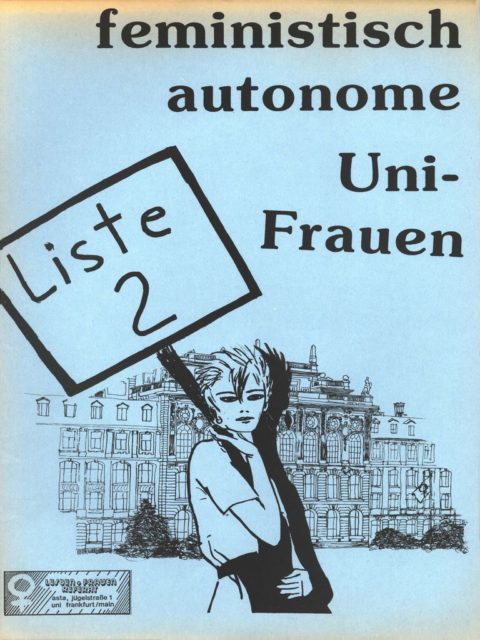
The first ‘women’s seminars’ are held. The universities of Berlin, Münster, Frankfurt, Munich, and Aachen pave the way. The impetus comes from female students at women’s centres. Alice Schwarzer takes up a lectureship in sociology at the University of Münster and organises the first women’s seminar on sexuality.
1975: Saarbrücken’s Autonomes Frauenreferat
Students at the University of Saarbrücken establish the first autonomes Frauenreferat [‘independent department for women’s affairs’]. Over the coming years, further departments for women’s affairs follow at more than 20 universities. By 1984, there is a department for women’s affairs at approximately every one in three universities.
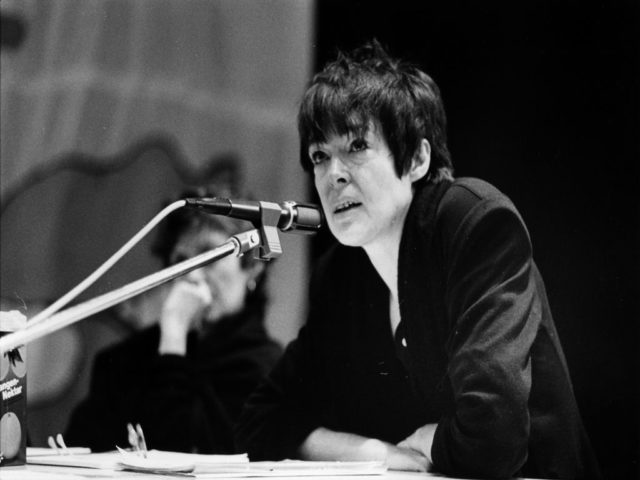
‚Women’s studies‘ Becomes a Major in 1976
Christina Thürmer-Rohr, professor at the Institute for Social Education at the Pädagogische Hochschule in Berlin, establishes ‘women’s studies’ as a major at the college of education. Her teaching and research foci are: feminist theory, human rights, and dialogue/didactics.
The Munich-based publishing house Frauenoffensive issues a bibliography of approximately 100 unpublished diplomas, master’s and seminar projects, theses, and talks on topics relating to women.1
![Frauen und Wissenschaft : Beiträge zur Berliner Sommeruniversität für Frauen, Juli 1976. Gruppe Berliner Dozentinnen [Hrsg.] - Berlin: Courage-Verl., 1977. (FMT-Signatur: FE.03.009.01) Frauen und Wissenschaft : Beiträge zur Berliner Sommeruniversität für Frauen, Juli 1976. Gruppe Berliner Dozentinnen [Hrsg.] - Berlin: Courage-Verl., 1977. (FMT-Signatur: FE.03.009.01)](http://frauenmediaturm.de/wp-content/uploads/2018/07/Frauen_und_Wissenschaft-480x640.jpg)
June 1976: The First Summer University in Berlin
A group of 12 lecturers from Berlin organise the first summer university for women at the Freie Universität. Approximately 600 women from academia and the women’s movement meet over five days.2 It is the start of further summer universities, at which the central issues of the women’s movement are discussed; the vanguard of the future international women’s university (Internationale Frauenuniversität, ifu) attends. Subsequently a number of consciousness-raising groups, women’s seminars, women’s lecture series, summer universities, congresses, conferences, and colloquia are set up at universities.The first Nationales Treffen von Frauen aus Naturwissenschaft und Technik takes place in June in Aachen. 60 participants attend.
The main theme is the discrimination of women in the natural sciences and technology3, whereby the organisers appeal not only to female students and scientists at universities, but also to female engineers and physicists working in industry. The natural scientists and engineers form a network, and in 1988 found Frauen in Naturwissenschaft und Technik NUT e.V. (FiNuT). One of FiNuT’s aims is to increase the proportion of female professors and students in the natural sciences and technology
October 1978: Foundation of the FFIBZ
The Frauenforschungs-, Bildungs- und Informationszentrum (FFBIZ) is founded in Berlin (see dossier on women’s projects in Germany). The centre’s establishment was preceded by debate about the autonomy or institutionalisation of women’s studies. Barbara Duden and Irene Stöhr articulated a vision of an autonomous women’s education and research centre in the feminist newspaper Courage.4
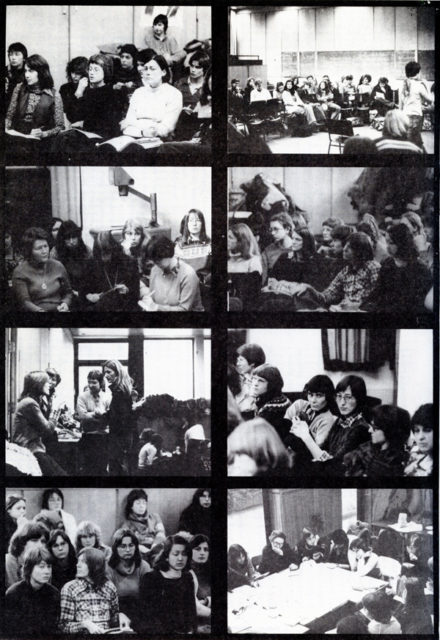
24-26 November 1978: Feminist Conferences and Journals
The Verein Sozialwissenschaftliche Forschung und Praxis für Frauen oragnises the conference Feministische Theorie und Praxis in sozialen und pädagogischen Berufsfeldern in Cologne.5 The society was founded in February 1978 in Darmstadt. Its declared objective is the assertion of an emancipatory understanding of women’s studies: an end to the distinction between theory and practice, between academic and non-academic women; a crackdown on discriminatory tendencies in scholarship; and the implementation of feminist research and teaching projects.
The first volume of Beiträge zur feministischen Theorie und Praxis is published. The essay collections – each approximately 150-page volume addressing one key issue – are published with Frauenoffensive by the Cologne-based Verein Sozialwissenschaftliche Forschung und Praxis für Frauen; later volumes are self-published.
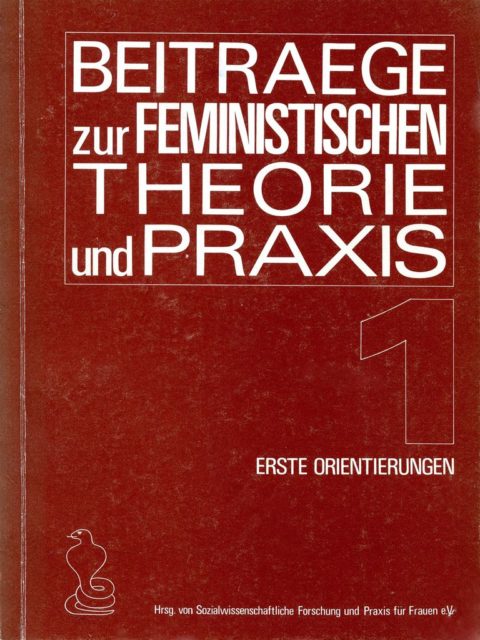
Maria Mies, professor at the Fachhochschule für Sozialpädagogik in Cologne, publishes an article entitled “Methodische Postulate zur Frauenforschung – dargestellt am Beispiel der Gewalt gegen Frauen” in the first volume of Beiträge.6 In this article, Mies argues for, amongst other things, the natural bias of feminist women’s studies and views female academics as not only researchers, but simultaneously the party concerned. She calls for a deviation from the current ‘neutral’ research; instead, changing the status quo is to be the point of departure for scientific findings. These demands, which Mies had developed based on her experiences founding the women’s shelter in Cologne, are considered the starting point for methodological debate in German women’s studies (see dossier female shelters) .7
20-24 March 1979: Frauenforum im Revier
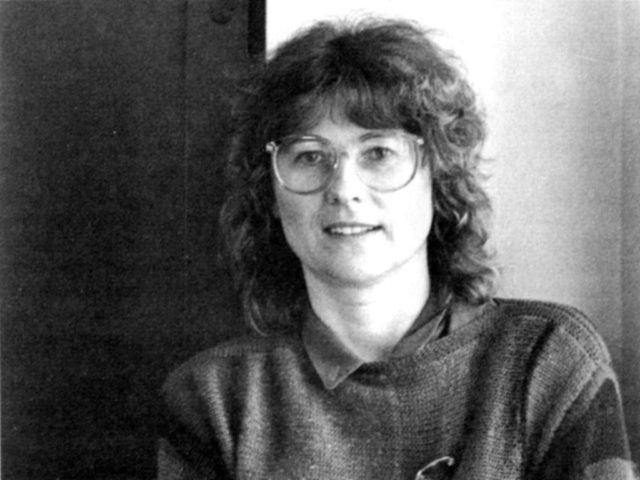
Over 5,000 women attend the 1. Frauenforum im Revier at the Pädagogische Hochschule in Dortmund. Motto: “Frauen begreifen ihren Alltag”, or “women get to grips with their daily lives”. The women’s education event consisting of films, lectures, and courses is organised by a group of female lecturers, among them the professor of education Sigrid Metz-Göckel, and female students from the University of Dortmund. Above all the conveners want to appeal to “housewives, mothers, and older women”, at which they succeed: 90% of the attendees are not university graduates. As a result of the Frauenforum im Revier – further meetings are to follow – women’s studies is established at the university of Dortmund two years later: the degree programme addresses women’s topics for women without an academic background, women with families, and women who were steered away from education with the ‘you’re-going-to-get-married-anyway’-argument. Over the next years, ‘women’s studies’ is also established at other universities.
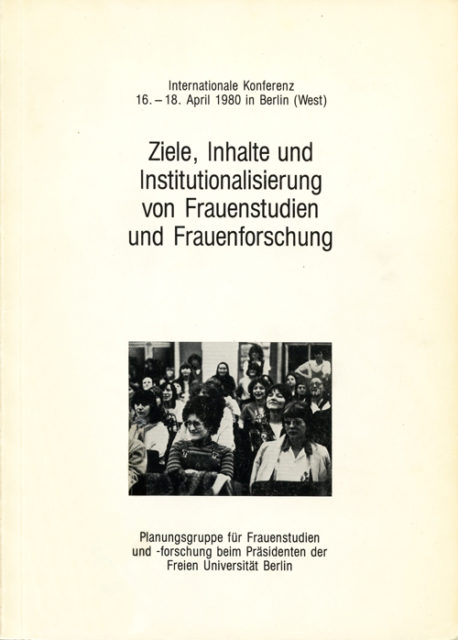
19 April 1979: Missions to Develop…
The section Frauenforschung in den Sozialwissenschaften is established withinwithin the Deutsche Gesellschaft Soziologie (DGS) on the initiative of the Munich-based DGS group headed by Lerke Gravenhorst and Ilona Kickbusch. The section “considers its mission to be to develop women’s studies in the context of existing academic structures.“8
22-24 February 1980: …Women’s Studies
The conference Frauen in den Sozialwissenschaften takes place at the Pädagogische Hochschule in Dortmund. Female academics from across the federal state discuss their findings and describe first successes and difficulties in establishing an institutional foothold for women’s studies at universities. The participants call for permanent positions for women’s studies.
16-18 April 1980: …and Female Academics
Berlin’s Minister of Science Glotz organises a three-day international conference with the topic Ziele, Inhalte und Institutionalisierung von Frauenstudien und Frauenforschung at the Freie Universität in Berlin. 250 women from Berlin, Germany, the USA, France, Italy, the Netherlands, Denmark, Sweden, and the UK attend.9
![Memorandum und Dokumentation zur Situation von Wissenschaftlerinnen an den Hochschulen von NRW und Vorschläge zu ihrer Verbesserung (1981). - Arbeitskreis der Wissenschaftlerinnen in NRW [Hrsg.]. Dortmund : Selbstverl. (FMT-Signatur : BI.05.041). Memorandum und Dokumentation zur Situation von Wissenschaftlerinnen an den Hochschulen von NRW und Vorschläge zu ihrer Verbesserung (1981). - Arbeitskreis der Wissenschaftlerinnen in NRW [Hrsg.]. Dortmund : Selbstverl. (FMT-Signatur : BI.05.041).](http://frauenmediaturm.de/wp-content/uploads/2018/07/Memorandum_Situation_Frauen_Hochschule.jpg)
January / February 1981: A Decisive Memorandum
The Arbeitskreis der Wissenschaftlerinnen an Hochschulen von NRW publishes a memorandum about the conditions for female academics at universities in North Rhine-Westphalia. On the basis of independently gathered statistics on gender in higher education institutions10 the academics develop a catalogue of demands. This contains a call, for example, for a quota for lectureships, for a gender-balanced make-up of committees, and for the expansion of specialisations in women’s studies and women’s teaching. The working group – composed of approximately 50 female academics and headed by the professor of sociology Sigrid Metz-Göckel – was founded in 1980 with the aim to negotiate with North Rhine-Westphalia’s Ministry of Science and to promote the institutionalisation of women’s studies.11
1981: How the FU Supports Her Women
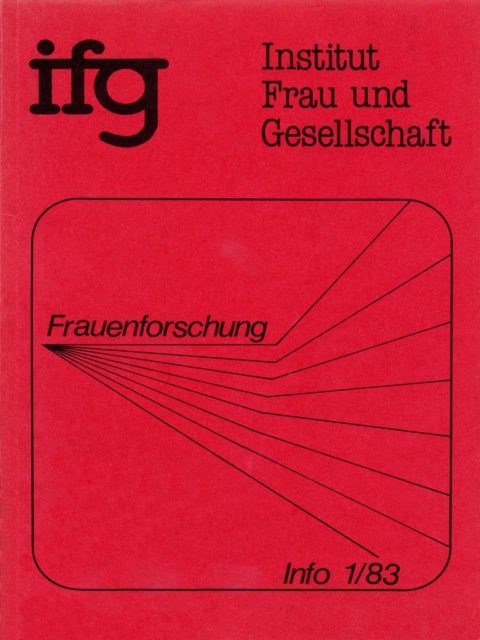
The Zentraleinrichtung zur Förderung von Frauenforschung in Deutschland is established at the Freie Universität (FU) in Berlin. At the same time, the FU’s Academic Senate decides to give special support to women across the university sector and to favour women “with equivalent qualifications” in the hiring process.
22-24 May 1981: Symposium Frauen im Wissenschaftsbetrieb
The symposium Frauen im Wissenschaftsbetrieb takes place at the University of Bielefeld. The conference is organised as part of a research project of the same name that is being conducted by the Faculty of Education. Approximately 160 female academics and students from various disciplines and universities present current projects on this topic in talks and discussion groups.12
15 August 1981: Foundation of the IFG
On the suggestion of Dr. Helga Wax, member of parliament for the CDU, the state government of Lower Saxony creates the Institut Frau und Gesellschaft (IFG) in Hannover. The institute is headed by Rita Süßmuth, who is still a professor of education at the University of Dortmund at the time. The institute’s tasks are: the development and execution of theoretical and empirical research; proposal of research projects; research bundling and documentation; public relations; and the provision of scientific policy advice.
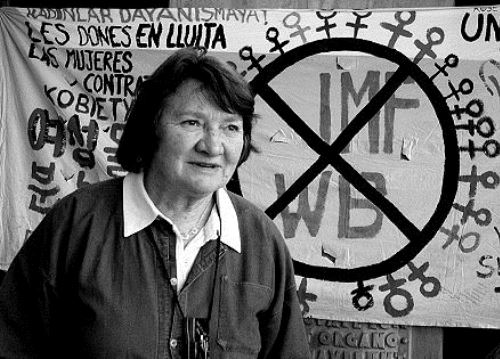
Feminist researchers in the field of women’s studies are divided by the institute. While some consider the IFG a necessary further step towards the institutionalisation of women’s studies, Prof. Dr. Maria Mies (author of “Methodische Postulate zur Frauenforschung”) and Dr. Carola Möller (in the name of the society Sozialwissenschaftliche Forschung und Praxis für Frauen) distance themselves from the institute. In fact, Mies and Möller advise all feminist researchers to keep their distance because they consider “feminist women’s studies to be neutralised and assimilated” by the institute.13
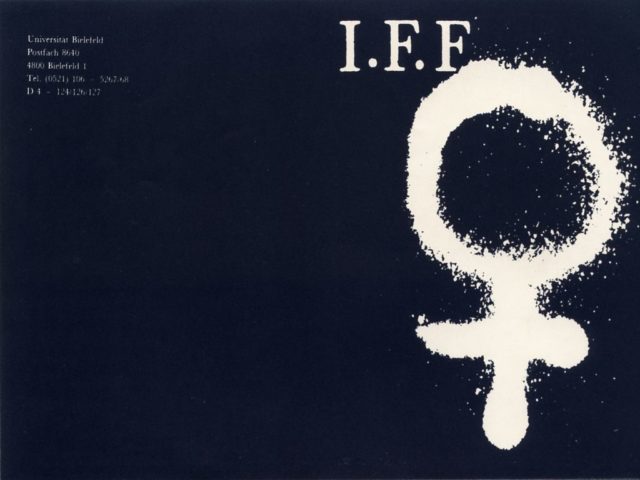
7 July 1982: The IFF in Bielfeld
The Interdisziplinäre Forschungsgruppe Frauenforschung, Bielefeld (IFF) is set up at the University of Bielefeld. It is the first official women’s studies institute at a German university.14 A Geschäftsstelle Frauenforschung [‘office of women’s studies’] had already been established in 1980, the aim of which was the permanent institutionalisation of women’s studies as a research focus in higher education. In 2004 the IFF is renamed Interdisziplinäres Zentrum für Frauen- und Geschlechterforschung the centre still exists today as an independent research institute.
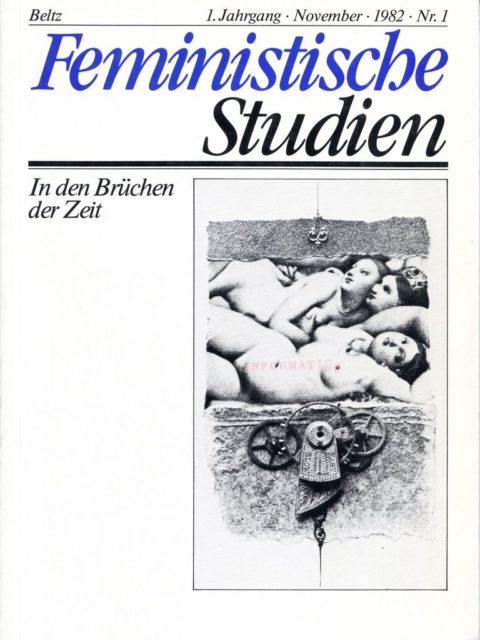
November 1982: The Rise of the Feministische Studien is followed…
The first volume of the today biannual Feministische Studien is published with Beltz-Verlag. The editors are specifically looking to establish a dialogue between non-institutionalised and academic women’s studies: “Only non-institutionalised women’s studies can contribute, as it neither retreats from the context of the women’s movement’s campaign and discussion, nor permits its own ‘ghettoisation’ within the academic domain.“15
… by the First Informationsdienst Frauenforschung in 1983
The first volume of Informationsdienst Frauenforschung is published by the Institut Frau und Gesellschaft, in which the institute introduces itself; it wants to join the conversation “between female colleagues active in the most diverse areas of society and at institutions for women’s studies’, women’s work, and women’s politics“.16
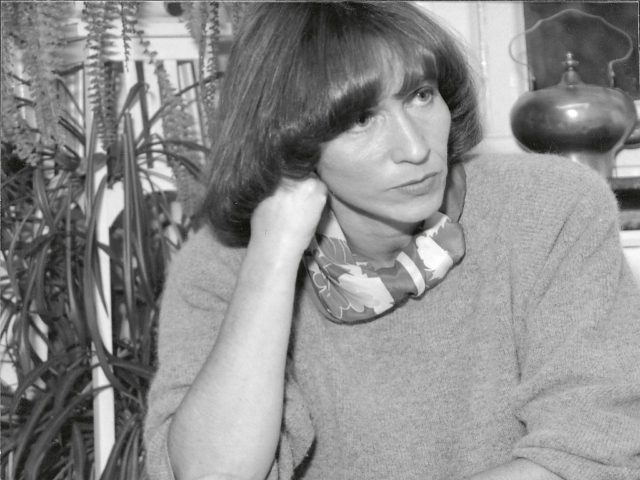
Supported by the North Rhine-Westphalian government, Ulla Bock, Anne Braszeit, and Christiane Schmerl publish the results of their study “Frauen im Wissenschaftsbetrieb” with Beltz-Verlag and develop concrete suggestions for the improvement of study and working conditions for women at universities on the basis of this empirical data.17
1984: FMT’s Year of Birth
In a booklet created for the launch of the Hamburger Institut für Sozialforschung, co-founder Alice Schwarzer criticises sections of women’s studies in her article Feministinnen sind Piratinnen.
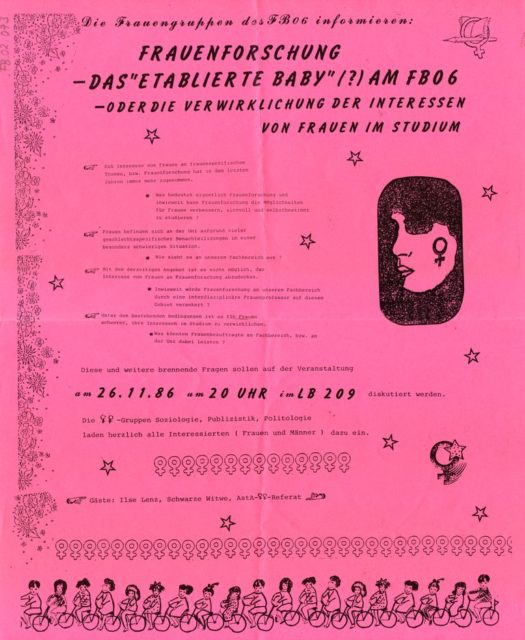
In 1974/75 Schwarzer had held one of the first women’s seminars for female sociologists in Münster and now writes: “For a long time now not only the feminist, but also the reformist and the decidedly reactionary have flown under the flag of women’s studies. There is colossal confusion. And it affects female academics and students, who are more disorientated nowadays than they were during the 70s. Events like the annual West-Berlin Sommeruniversität für Frauen – at which there is presently more talk about trances, signs of the zodiac, and tarot cards than about research – are sad proof of this.“18
In the same year and with the financial support of Jan Philipp Reemtsma, Alice Schwarzer launches the Feministische Archiv und Dokumentationszentrum (since 1994 FrauenMediaTurm in Cologne). Schwarzer regards the safeguarding of the past and present history of feminist theory and practice as the prerequisite for research on gender relations.
Rework of the Hochschulrahmengesetz in 1985
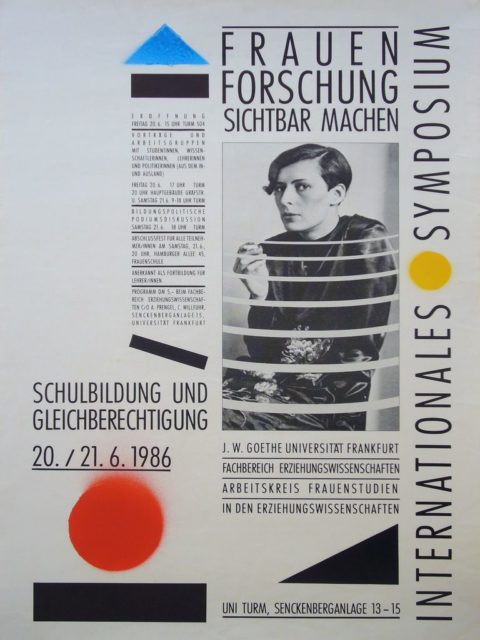
The Hochschulrahmengesetz is reworked and the advancement of women formulated as a task for universities: “In the fulfilment of their functions, universities are to work towards eliminating existing disadvantages for female researchers.“ (HRG §2, Absatz 2).
1987: The first Frauenbeauftragte
The advancement of women is taken up in the Hochschulgesetz and the Fachhochschulgesetz. Furthermore, higher education institutions are to appoint Frauenbeauftragte [‘women’s representatives’].19 At the Goethe-Universität in Frankfurt am Main, the first C4 professorship in sociology is filled for women’s studies. Title: Frauenarbeit in Produktion und Reproduktion, Frauenbewegung. Ute Gerhard is appointed to the chair. This professorship is the longest existing C4-W3 professorship in women’s and gender studies in Germany.20
1989: Foundation of the BAFF
On the eve of International Women’s Day the Bundesarbeitsgemeinschaft Autonomer Frauenforschungseinrichtungen (BAFF), a fusion of various feminist scientific and research institutions, is founded in Frankfurt.21
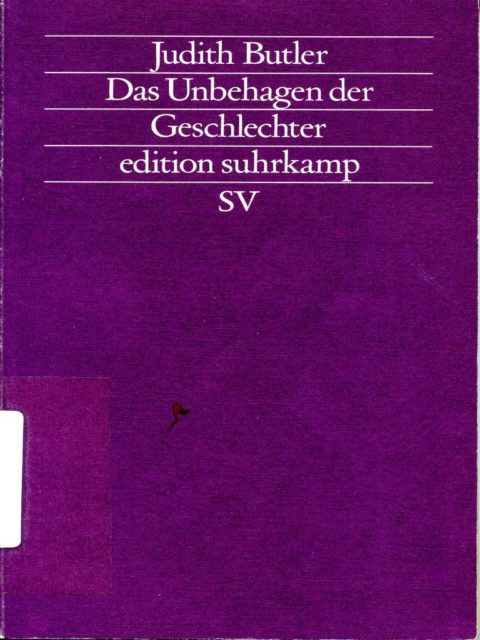
What Happens Next?
In 1991 Judith Butler’s Gender Trouble22 eis published in German translation by Suhrkamp under the title Das Unbehagen der Geschlechter. Butler’s radical deconstructive discourse theory leads – in its German reception – to controversy and dramatic changes within women’s and gender studies. Butler regards both ‘social gender’ (gender) and ‘biological gender’ (sex) as socially constructed and therefore fluid categories. Butler becomes one of the central proponents of ‘queer theory’, which ascribes the subject’s self-definition a central role and argues that gender and sexual identity are created by the subject’s actions and behaviours (performance). Consequently, people can define themselves, for example as ‘female’ or ‘male’. This leads to conflict with the proponents of radical feminism, who accuse Butler and queer theory of no longer defining the social repression of women by the patriarchy as an objectively existing problem, but instead attributing it to the subject and its self-definition. As a political category, ‘women’ are progressively disbanded via queer identity politics, which unravels identity into ever smaller sub-groups. ‘Gender studies’ is influenced by the proponents of ‘queer theory’. The initially feminist women’s studies is replaced by a ‘gender studies’ shaped by postmodernism and deconstruction. Many feminist researchers criticise this development.
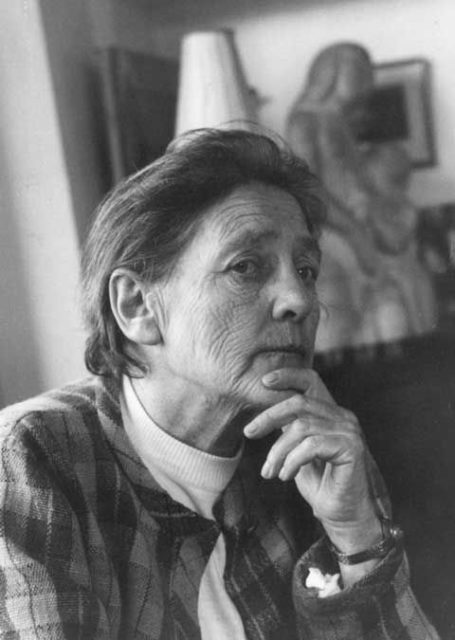
On 19 January 1993 the postgraduate programme Geschlechterverhältnis und sozialer Wandel – Handlungsspielräume und Definitionsmacht von Frauen is launched in North Rhine-Westphalia thanks to the involvement of five professors from across four universities and the network of women’s studies: Sigrid Metz-Göckel (Dortmund), Ursula Müller (Bielefeld), Ursula Beer (Dortmund), Doris Janshen (Essen), and Ilse Lenz (Bochum).23
The Marie-Jahoda-Gastprofessur für international Geschlechterforschung is established at the University of Bochum in 1994.24
Over the next years, further universities in German-speaking regions follow, e.g. the University of Vienna with the Käthe-Leichter-Gastprofessur in 1999, or Rhineland-Palatinate with the rotating Klara Marie Fassbinder-Gastprofessur in 2001. Twenty years later there are approximately a dozen guest professorships for gender studies in the German-speaking countries in Europe.
On 21 October 1997, and in time for the winter semester 1997/1998, the first interdisciplinary master’s programme for Geschlechterstudien/Gender Studies in the country is launched at the Humboldt Universität in Berlin.25
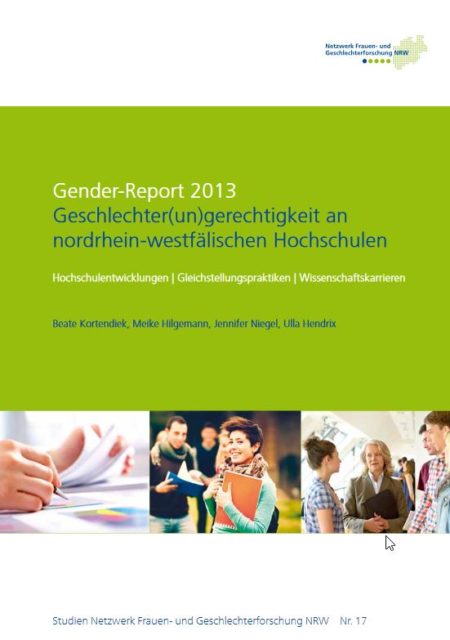
At the Genderkonferenz in 2006 a parent organisation for the approximately 70 women’s and gender studies institutes is established Frauen- und Geschlechterstudien im deutschsprachigen Raum (KEG) – that issues invitations to annual symposia.
According to the 2013 Gender-Report the proportion of women studying at higher education institutions in Germany is 47.5%. The number of female and male students has for years hardly varied at all in the new federal states, whereas in the old federal states the number of male students outweighs the number of female students and the size of the gender gap remains consistent.26
However, many subjects evince an even larger “gender gap”. In the so-called “MINT–Fächer” (STEM-subjects) – maths, computer science, natural sciences, and technology – every third student is female, in engineering only every fifth. The ratio is exactly the reverse with respect to the study of German literature: here, the proportion of male students is 23%.
Sources
1 Bibliografie von unveröffentlichten Arbeiten zu frauenspezifischen Themen : Diplom-, Magister-, Seminar- und Zulassungsarbeiten, Dissertationen und Referate (1976). - Spazierer, Monika [ed.] ; Dombrowski, Kristine [ed.]. München : Frauenoffensive (FMT-Shelf Mark: NA.03.047).
2 Lenz, Ilse (2008): Die Neue Frauenbewegung in Deutschland : Abschied vom kleinen Unterschied ; eine Quellensammlung. - 1. Aufl., Wiesbaden : VS, Verlag für Sozialwiss., p. 215.
3 2. [_Zweites] Treffen von Frauen aus Naturwissenschaft und Technik : Hamburg, 6. - 8. Januar 1978 ; Dokumentation. - Frauen in Naturwissenschaft und Technik (FiNuT) [ed.]. Hamburg: o.V., p. 26-28 (FMT-Shelf Mark BI.12.027-02).
4 Lenz, Ilse (2008): Die Neue Frauenbewegung in Deutschland : Abschied vom kleinen Unterschied ; eine Quellensammlung. - 1. Aufl., Wiesbaden : VS, Verlag für Sozialwiss., p. 220.
5 The conference reports are published in Beiträge zur feministischen Theorie und Praxis. See Feministische Theorie und Praxis in sozialen und pädagogischen Berufsfeldern : Berichte vom Kölner Kongress. (1979) - In: Beiträge zur feministischen Theorie und Praxis, Nr. 2 (FMT-Shelf Mark: Z-F014:1979-2).
6 Mies, Maria (1978): Methodische Postulate zur Frauenforschung : dargestellt am Beispiel der Gewalt gegen Frauen. - In: Beiträge zur feministischen Theorie und Praxis, Nr.1, p. 41 - 63 (FMT-Shelf Mark: Z-F014:1978-1).
7 Frauenforschung - Postulate einer engagierten Wissenschaft (1982). - In: Lila Distel, Nr. 19, siehe Pressedokumentation: Hochschule: Theorie der Frauenforschung (FMT-Shelf Mark: PD-BI.10.01).
8 Sektionsbericht für Soziologie 1/80, p. 73f. Zitiert nach Matthes, Bettina (2001): Aus der Geschichte… Die Sektion „Frauenforschung in den Sozialwissenschaften“ in der DGS, . 7. retrieved from: frauen-undgeschlechterforschung.de/tl_files/content_sektion/pdf/selbstverstaendnis/Sektionschronik.pdf [PDF-Document].
9 Ziele, Inhalte und Institutionalisierung von Frauenstudien und Frauenforschung : Dokumentation der Internationalen Konferenz vom 16. bis 18. April 1980 in Berlin, West. (1982). - Zentraleinrichtung zur Förderung von Frauenstudien und Frauenforschung [ed.]. 2. Aufl. Berlin : Selbstverl., (FMT-Shelf Mark BI.05.055).
10 Memorandum und Dokumentation zur Situation von Wissenschaftlerinnen an den Hochschulen von NRW und Vorschläge zu ihrer Verbesserung (1981). - Arbeitskreis der Wissenschaftlerinnen in NRW [ed.]. Dortmund : Selbstverl. (FMT-Shelf Mark: BI.05.041).
11 Lenz, Ilse (2008): Die Neue Frauenbewegung in Deutschland : Abschied vom kleinen Unterschied ; eine Quellensammlung. - 1. Aufl., Wiesbaden : VS, Verlag für Sozialwiss., p.562 (FMT-Shelf Mark: FE.03.NA.002).
12 Interdisziplinäre Forschungsgruppe Frauenforschung, Universität Bielefeld : Informationsmaterialien der IFF (1983). - Interdisziplinäres Zentrum für Frauen- und Geschlechterforschung [ed.]. Bielefeld : Selbstverl. (FMT-Shelf Mark BI.05.086).
13 Geisel, Beatrix: Mitarbeit oder Verweigerung? : Das Institut „Frau und Gesellschaft“ entzweit die Frauenforscherinnen. - In: Frankfurter Rundschau, 28.01.1984, seePressedokumentation: Hochschule: außeruniversitäre Frauenforschungsstellen und Frauenuniversitäten 1978-1992 (FMT-Shelf Mark PD-BI.10.04) / Frauenforschung bei der CDU : Das Institut „Frau und Gesellschaft“ Hannover. - In: taz, 12.10.1983, see Pressedokumentation Hochschule: außeruniversitäre Frauenforschungsstellen und Frauenuniversitäten 1978-1992 (FMT-Shelf Mark PD-BI.10.04).
14 Memorandum II des Arbeitskreises der Wissenschaftlerinnen von NRW 1984 : priviligiert - und doch diskriminiert (1984. - Arbeitskreis der Wissenschaftlerinnen in NRW [ed.] ; Universität
15 Woesler de Panafieu, Christine (1982): Editorial. - In: Feministische Studien, Nr. 1, p.3 (FMT-Shelf Mark: Z-F015).
16 Informationsdienst Frauenforschung (1983), Nr. 1, p. 1-2 (FMT-Shelf Mark: Z-F016).
17 Bock, Ulla ; Braszeit, Anne ; Schmerl, Christiane (1983): Frauen im Wissenschaftsbetrieb : Dokumentation und Untersuchung der Situation von Studentinnen und Dozentinnen unter besonderer Berücksichtigung der Hochschulen von Nordrhein-Westfalen. - Weinheim [u.a.] : Beltz (FMT-Shelf Mark BI.05.062).
18 Schwarzer, Alice (1984): Feministinnen sind Piratinnen. - In: Hamburger Institut für Sozialforschung 1984. - Hamburger Institut für Sozialforschung [ed.]. Hamburg : Selbstverlag, 1984, p.107 (FMT-Shelf Mark: BI.01.050).
19 Vorwärts - Auf der Stelle! (1996). - Arbeitskreis der Wissenschaftlerinnen NRW [ed.]. Memorandum III. Dortmund : Univ. Dortmund (FMT-Shelf Mark BI.05.220).
20 Bock, Ulla (2015): Pionierarbeit: Die ersten Professorinnen für Frauen- und Geschlechterforschung an deutschsprachigen Hochschulen 1984-2014. - Frankfurt am Main (u.a.) : Campus-Verl., p. 47 f. (FMT-Shelf Mark BI.10.236).
21 Autonome Frauenforschungseinrichtungen bundesweit zusammengeschlossen. - In: zweiwochendienst, 07.03.1989, see Pressedokumentation Hochschule: außeruniversitäre Frauenforschungsstellen und Frauenuniversitäten 1978-1992 (FMT-Shelf Mark PD-BI.10.04). / Pressemitteilung „Bundesarbeitsgemeinschaft autonomer Frauenforschungseinrichtungen (BAFF) gegründet“. - In: Fraueninformationsblatt, SS 1989, see Pressedokumentation Hochschule: außeruniversitäre Frauenforschungsstellen und Frauenuniversitäten 1978-1992 (FMT-Shelf Mark PD-BI.10.04).
22 Butler, Judith (1991): Das Unbehagen der Geschlechter. - Frankfurt am Main : Suhrkamp (FMT- Shelf Mark : FE.10.085).
23 Schmidt, Uta C. (2013): Das Netzwerk Frauenforschung NRW : Geschichte und Gegenwart einer Wissenschaftsinstitution. - Essen : Netzwerk Frauen- und Geschlechterforschung NRW, p. 111 (FMT-Shelf Mark BI.10.101).
24 Bock, Ulla (2015): Pionierarbeit: Die ersten Professorinnen für Frauen- und Geschlechterforschung an deutschsprachigen Hochschulen 1984-2014. - Frankfurt am Main (u.a.) : Campus-Verl., p. 300 (FMT-Shelf Mark BI.10.236).
25 Siehe Katrin Schäfgen (o.J.): Der Studiengang Geschlechterstudien/Gender Studies an der Humboldt-Universität zu Berlin. – retrieved from: Humboldt-Universität zu Berlin. Zentrum für transdisziplinäre Geschlechterstudien: www.gender.hu-berlin.de/de/zentrum/geschichten/pdf-dokumente/geschichtestudgang [PDF-Document].
26 Kortendiek, Beate ; Hilgemann, Meike ; Niegel, Jennifer ; Hendrix, Ulla (2013): Gender-Report 2013 : Geschlechtergerechtigkeit an nordrhein-westfälischen Hochschulen. - Essen : Netzwerk Frauen- und Geschlechterforschung NRW, p. 25 (FMT-Shelf Mark BI.05.231).
All links were last retrieved on 29.01.2018.
Bibliography
Sources Online
Matthes, Bettina (2001): Aus der Geschichte… Die Sektion „Frauenforschung in den Sozialwissenschaften“ in der DGS, S. 7 [PDF-Dokument].
Schäfgen, Katrin (o.J.): Der Studiengang Geschlechterstudien/Gender Studies an der Humboldt-Universität zu Berlin. - Humboldt-Universität zu Berlin. Zentrum für transdisziplinäre Geschlechterstudien [PDF-Dokument].
Recommendations
Tröger, Annemarie (1978): Summer universities for women: the beginning of women's studies in Germany? New German critique: an interdisciplinary journal of German studies, Heft 13, 1978 (FMT-Shelf Mark: FE.03.147-a).
Kleinau, Elke (1983): Zur Studien- und Arbeitssituation von Frauen an bundesdeutschen Hochschulen und Universitäten. Oldenburg: BIS-Verlag, 1983 (FMT-Shelf Mark: BI.10.064-a).
Mies, Maria (1984): Frauenforschung oder feministische Forschung?: Die Debatte um feministische Wissenschaft und Methodologie. In: Beiträge zur feministischen Theorie und Praxis 7, Nr. 11, S. 40-60 (FMT-Shelf Mark: Z-FO14:1984-11-a).
Press documentation
Press documentation on Women's Studies: PDF-Dokument
The FMT press documentation is thematically structured and indexed. It comprises articles of the general public press, feminist press and other documents, such as leaflets and archival documents.
Further FMT-sources (selection)
FMT-literature Women's Studies: PDF-Download
Related Topics
Feminist Linguistics and Gender Neutral Language in Germany
Feminist Linguistics and Gender Neutral Language in Germany
Before the 1970ies women were practically invisible in the german language. If one man was part of a given group, the male form was used - and the women vanished . Feminist linguistics changed that for good. › mehr
Women Who Work: Housework and Claim for Equal Pay
Women Who Work: Housework and Claim for Equal Pay
When the women’s movement started, housework was still by law a woman’s job. Feminists fought successfully for the abolition of this law. › mehr
A More Female Church? Feminist Theology and Women in the Church
A More Female Church? Feminist Theology and Women in the Church
Women want to have a voice in the Church – and not only as members of the congregation, but in dialogue with God and all the way up to leading positions within the church hierarchy. › mehr




